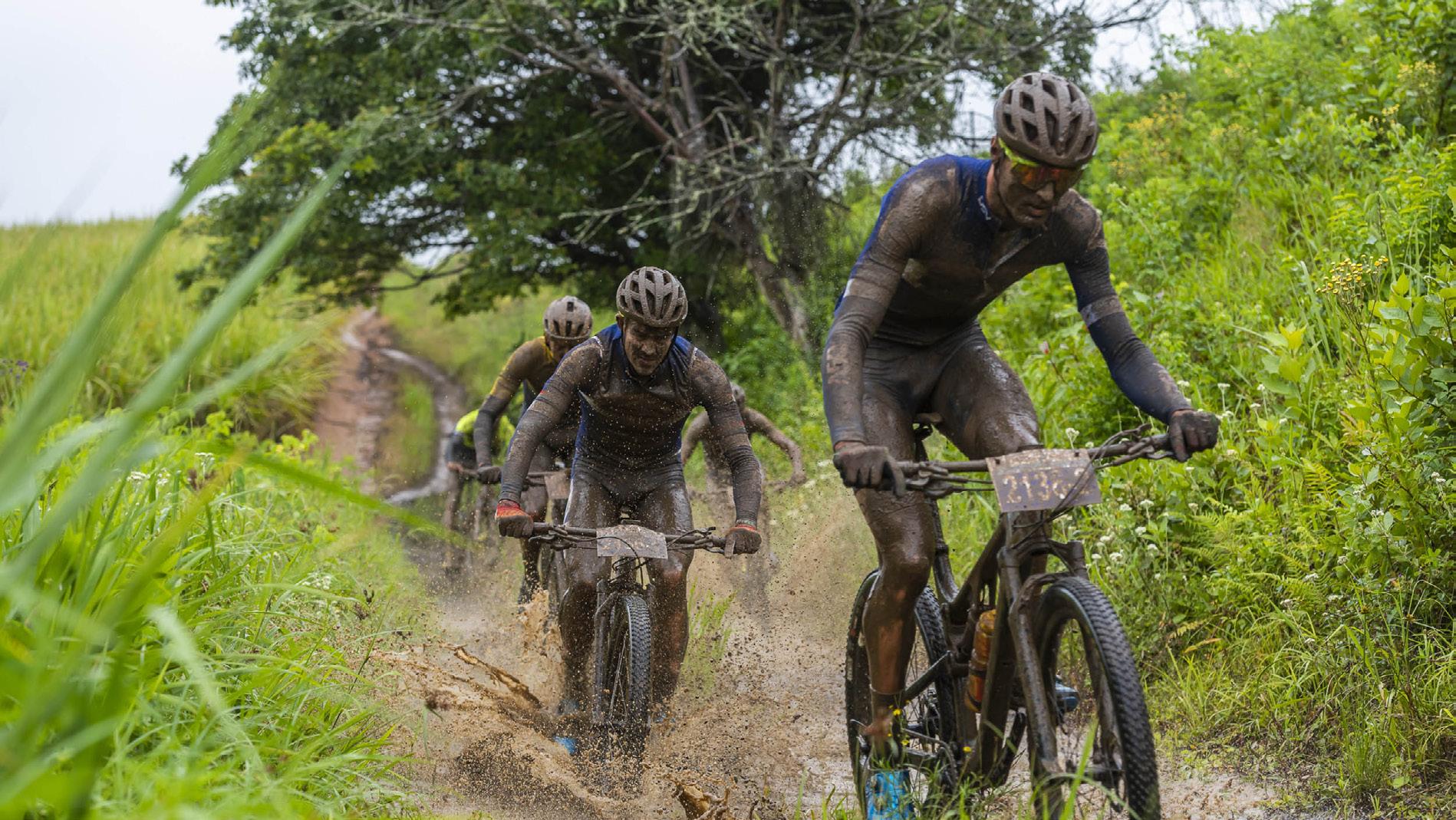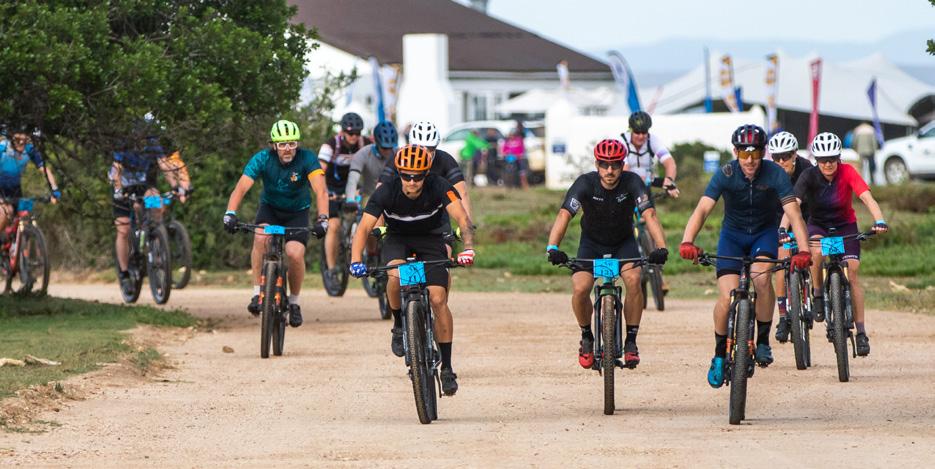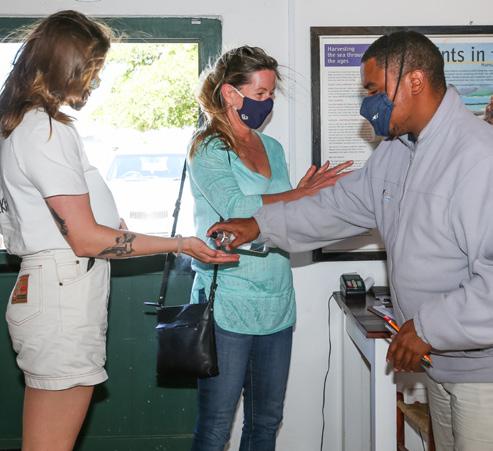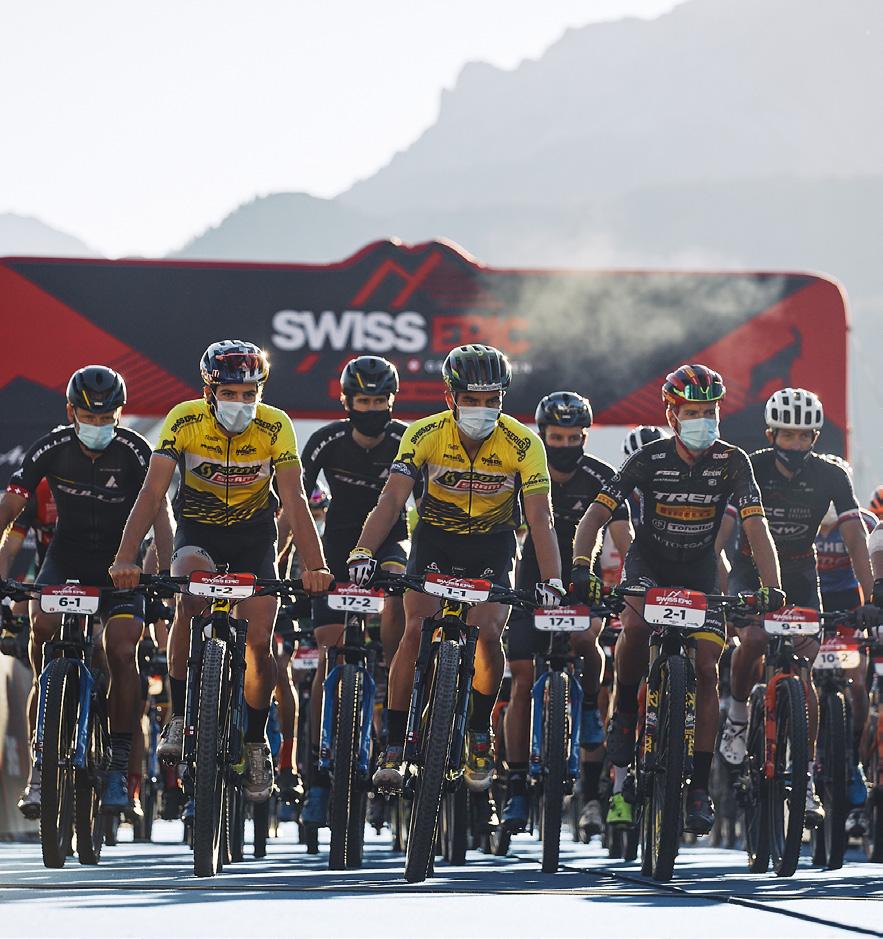
7 minute read
COVID PROOF EVENTS: Seamus looks at what events will possibly return next year
2021
covid proof
Advertisement
events
BY SEAMUS ALLARDICE
FOLLOWING THE SUCCESSFUL STAGING OF A NUMBER OF MOUNTAIN BIKE RACES LATE IN 2020 SEAMUS ALLARDICE LOOKS AT THE POTENTIAL ROAD MAP FOR HOSTING A FULLER CYCLING CALENDAR IN 2021. (NOTE: MOST OF THIS IS PURE SPECULATION OF COURSE…)
fter a year characterised by
Aabout as much uncertainty as most of us could handle it appears as if mountain biking may be edging towards a 2021 calendar of tentatively scheduled events. The annoying phase of 2020: “new normal” has fortunately been abandoned, along with any lasting conviction that anything will proceed as planned. Some events will no doubt run without a hitch however, but one suspects that uncontrollable external factors could determine which races are run and which aren’t.
One thing you can be sure of though is that event organisers will be doing all they can to ensure their events take place. After a year of lost income, for the businesses behind many mountain bike races, to survive they will need to sell entries and bill sponsors in 2021. This is how some events have managed already and what others are planning to do…

BOUTIQUE EVENTING
While the big events like FNB Wines2Whales, KAP sani2c and the Absa Cape Epic have historically proven most profitable for their owners there has always been space for smaller stage races in the calendar too. These events typically attract less than 200 entrants and due to constraints of geographic location or quirks of the organisation never really grew. Now it seems they’re about to have their moment of glory.
With the government and CSA cap on event size is 500 people, including crew, having a natural limit of 200 riders makes life a lot easier for small event organisers. From a personal perspective 200 people also doesn’t seem like that many, at a mountain bike event. While I’m no epidemiologist (well, aren’t we all armchair epidemiologists by this point) it certainly feels safer when the crowd at the race is smaller.
One of the first stage races to take place in accordance with the new Covid-19 protocols was the De Hoop Vlei MTB Experience. “Riders had to complete a Cape Nature indemnity and Covid questionnaire prior to entering the reserve” Overberg MTB Event’s Anneke Jacobs confirmed. “At the event all the necessary Covid protocols were adhered to; including the wearing of face masks, frequent hand sanitising and social distancing, etc. Our water points also had the


necessary equipment for the staff to adhere to the safety standards.”
During the stages the riders were naturally dispersed and off-the-bike the De Hoop Collection did all they could to facilitate social distancing. “De Hoop provided a Bedouin tent in front of the Shed restaurant, to add more room, which made it much easier to adhere to Covid protocols” Jacobs explained. “This went a long way to creating a sense of open space for everyone in attendance at meals. I felt it helped dispel the anxiety which I think most of us now feel when going into crowded spaces.”
One of De Hoop Nature Reserve’s advantages over other event venues is its abundance of accommodation. “We had approximately 125 riders, many of whom brought their families” Jacobs pointed out. “But as all the De Hoop Collection accommodation was reserved for the De Hoop Vlei MTB Experience each family or riding group had their own accommodation. This allowed families to maintain their own safe ‘bubbles’ and nobody was put at risk sharing with unfamiliar people.”
“Bespoke, small and quaint events, are certainly the way to go for the foreseeable future” Jacobs predicted. And I’d agree. Though the industry needs larger events to take place too…
BIG EVENTS
KAP sani2c appears to have gone off without a hitch. Writing this a week after the race its heartening to note the lack of negative comments on their social media handles. Hopefully looking back on the 2020 race it will be remembered for the crazy weather and December date, rather than causing a Covid spike. At this stage it looks like that particular issue has been avoided, so perhaps it will serve as a road-map for other large events to follow.
Fellow KZN stage race, Grindrod Bank Berg & Bush have moved their 2021 date and are gearing up for a February edition. “We only have one event planned for 2021, Our traditional October date will fall away” founder Gary Green clarified. “The weather around the time of our new dates, in late February and early March, is stunning in the Berg. We are hoping to keep these dates for the foreseeable future.” “Over and above the government regulations we are looking closely at other sporting events taking place between now and the Berg & Bush to see how we can implement necessary protocols and improvements” Green stated. “Covid-related changes to our event that we are considering include: placing tents further apart in the Race Village, Self-help waterpoints for riders, online race briefings, sanitizers at all entrance and exit points around the Race Village, take-away type meals being served, smaller start batches or rolling start batches, and moving form one large marquee to a few smaller Bedouin style tents with open sides for improved ventilation in the main gathering area of the Race Village.”

The Swiss Epic image credit Francesco Narcisi

Image by Marius Holler

Meanwhile South Africa’s biggest and the world’s premier stage race, the Absa Cape Epic has postponed their 2021 event. The new dates are now the 17th to the 24th of October. Moving the Epic to after the Tokyo Olympics could be great for getting more elite women to take part, but will also provide time for vaccinations to come into effect and for travel restrictions to be lifted. As it stood there was simply too much chance, as I read the situation, that a March Epic would have been contested almost exclusively by a limited number of South African riders.
Being able to look forward to a near full-size Absa Cape Epic, with many of the world’s best mountain bikers taking part, will certainly keep me going through 2021. Especially if other events manage to stage editions within the shifting regulations, thus keeping the race industry going. As good as the boom in bike sales have been in late 2020, cycling in general and mountain biking in particular needs a full calendar of events to ensure the sport remains in good health.
PRACTICAL ADVICE FOR COVIDPROOFING
WATER POINTS Let’s face is, water points have always been a hot-bed for germs. So, sharping up the hygiene is a good idea, above and beyond Covid-19. Provide nutrition packs of pre-packaged goods which riders can take without needing to linger over the water point table. Provide a bottle service, taking riders’ individual bottles to water points. Staff to hand over items rather than allow riders to take for themselves, as the staff can more reliably sanitize and wear masks throughout.
RACE VILLAGES Most stage races have seen their tented villages shrinking in recent years so I expect that to continue with renewed vigour in 2021. Decentralise the race village with as many riders as possible encouraged to stay and eat off-site to limit the time period that riders are forced to congregate. Post-stage rather than dinner-time prize giving. Sponsors love the opportunity to present to the riders, but if prize givings can take place as the 3rd placed rider/team in each category crosses the line there will be no need for long evening presentation. Digital race briefings and sponsor presentations. This will require sponsors to create content which is more relevant to the riders, but I suspect many sponsors would be shocked to discover how little attention riders pay to the CEO speaking during dinner at a stage race anyway.
PERSONAL RESPONSIBILITY Most events will be doing their utmost to comply with regulations but they will need you to take responsibility for your own safety too. So… Follow the guidelines, they’re a bit of a pain but they’re better than not being able to attend races at all.
DON’T GO IF YOU’RE FEELING SICK. And don’t be a (rhymes with sick). Everyone is trying to keep their businesses afloat in these difficult times. Don’t rat them out or take to social media to complain, if you see something that you feel is wrong speak to the race organisers directly and help them keep everyone safe but still doing what we love.










